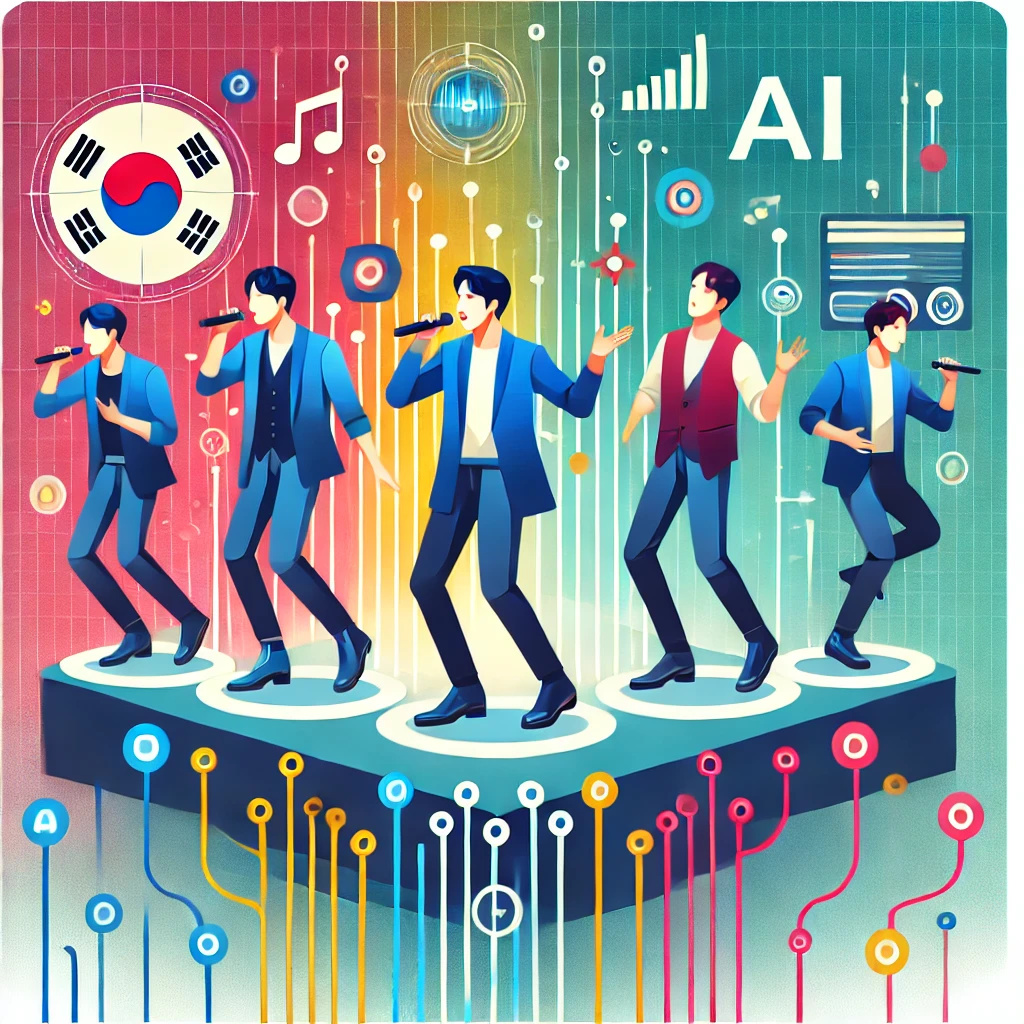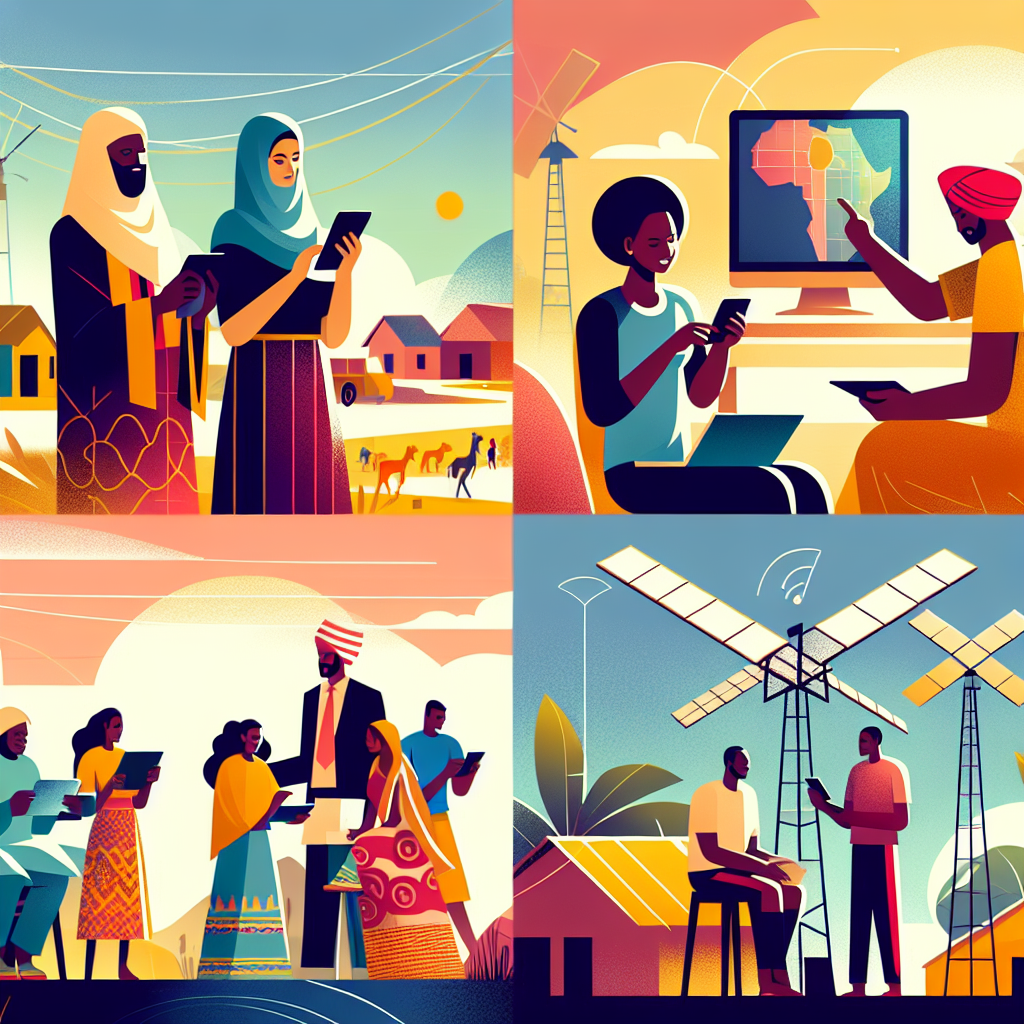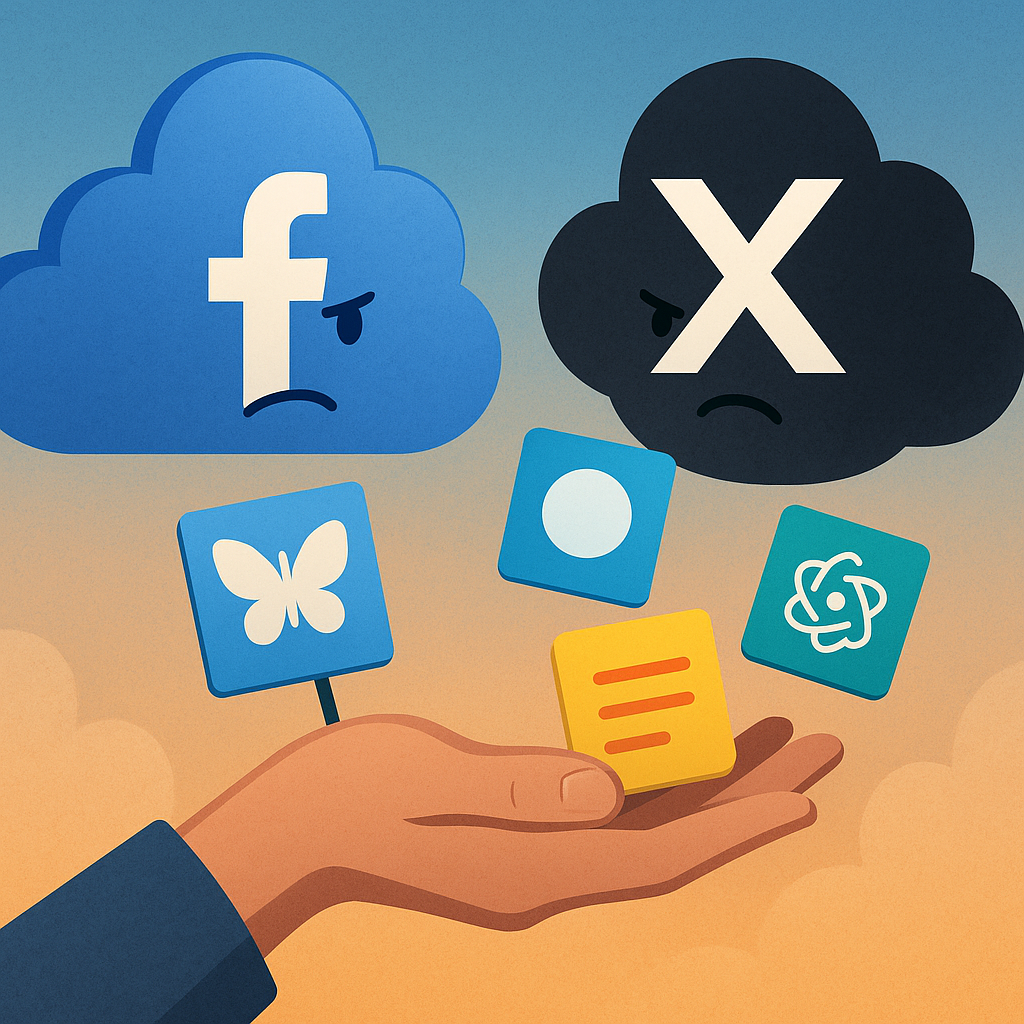The K-pop industry is currently experiencing a significant debate surrounding the use of artificial intelligence (AI) in music production. This discussion has gained momentum with several prominent K-pop groups, including the boy band Seventeen, experimenting with AI technology to create music videos and songs. Seventeen, which achieved remarkable success by selling approximately 16 million albums last year, has sparked interest with their latest album and single titled “Maestro.” The music video for this release features AI-generated scenes, prompting band member Woozi to express his willingness to explore AI in music creation during a recent album launch in Seoul.
Woozi emphasized the importance of adapting to technological advancements rather than resisting them. He stated, “We practiced making songs with AI, as we want to develop along with technology.” However, he later clarified on social media that all of Seventeen’s music is still composed by human creators. This clarification has led to mixed reactions among fans, with some advocating for stricter regulations on AI in music, while others are more accepting of its potential benefits. For instance, super fan Ashley Peralta believes that AI can assist artists in overcoming creative blocks, but she worries that an over-reliance on AI-generated lyrics could diminish the personal connection between artists and their fans.
The concerns surrounding AI in K-pop extend beyond individual fan opinions. Chelsea Toledo, another K-pop enthusiast and podcaster, expressed her apprehension about the impact of AI on the authenticity of music. She noted that if Seventeen were to release an album filled with AI-generated lyrics, it might not resonate with fans as authentically as their previous works. This sentiment reflects a broader concern within the K-pop community about maintaining the human touch in music creation, which is often seen as a vital aspect of the genre’s appeal.
From a production perspective, Chris Nairn, a composer and songwriter in the K-pop industry, acknowledged the industry’s inclination towards innovation. He pointed out that while AI can produce decent quality lyrics, it lacks the ability to create truly original content. Nairn believes that the demand for personal and heartfelt lyrics will only increase as fans seek a deeper connection with their favorite artists. This perspective suggests that while AI may play a role in the future of K-pop, it is unlikely to replace the essential human element that defines the genre.
The use of AI in K-pop is not limited to Seventeen; other groups, such as Aespa, have also begun incorporating AI into their music videos. However, this trend has raised concerns about the potential loss of artistic integrity and the challenges of crediting original artwork. Music journalist Arpita Adhya highlighted the pressure on K-pop artists to produce new content rapidly, often leading to the normalization of AI in the industry. As discussions about the ethical implications of AI continue, many in the K-pop community hope for clearer regulations to ensure that the artistry of musicians is not compromised. Ultimately, the influence of fans remains a powerful force, as artists are likely to respond to public sentiment regarding
Original news source: Will K-pop’s AI experiment pay off? (BBC)
🎧 Listen:
Slow
Normal
Fast
📖 Vocabulary:
| 1 | debate | A formal discussion or argument about a particular topic |
| 2 | momentum | The force or speed of movement or progress |
| 3 | prominent | Well-known or important in a particular field |
| 4 | experimenting | Trying out new ideas or methods to discover something |
| 5 | advancements | Progress or development in technology or knowledge |
| 6 | clarified | Made something clear or easier to understand |
| 7 | advocating | Supporting or recommending a particular cause or policy |
| 8 | apprehension | Anxiety or fear about something that might happen |
| 9 | resonate | To evoke a feeling of shared emotion or belief |
| 10 | inclination | A natural tendency or preference towards something |
| 11 | heartfelt | Deeply felt and sincere |
| 12 | incorporating | Including or integrating something as part of a whole |
| 13 | integrity | The quality of being honest and having strong moral principles |
| 14 | ethical | Relating to moral principles or the branch of knowledge dealing with these |
| 15 | sentiment | A view or attitude towards a situation or event; an opinion or feeling |
Group or Classroom Activities
Warm-up Activities:
– CHARADES
Instructions: Students will take turns acting out key terms or phrases related to the article (e.g., “AI in music,” “K-pop,” “Seventeen,” “music production”). The rest of the class will guess what the term or phrase is. This activity encourages vocabulary recall and teamwork.
– OPINION SPECTRUM
Instructions: Create a line in the classroom labeled “Strongly Agree” to “Strongly Disagree.” Read statements related to the article (e.g., “AI will enhance the music industry” or “AI will diminish the authenticity of music”). Students will position themselves along the line based on their opinion and explain their reasoning to a partner.
– MIND MAP
Instructions: In small groups, students will create a mind map on a large sheet of paper focusing on the article’s main themes such as “AI in K-pop,” “Fan Reactions,” and “Artistic Integrity.” They will brainstorm and add supporting details or examples related to each theme, enhancing their analytical skills.
– HEADLINE CREATION
Instructions: Students will work in pairs to create catchy headlines for the article that capture its essence. They will then share their headlines with the class. This activity fosters creativity and helps students practice summarizing content effectively.
– FUTURE PREDICTIONS
Instructions: In small groups, students will discuss and predict the future of AI in the K-pop industry based on the article’s content. They will present their predictions to the class, encouraging critical thinking and discussion about technological advancements in music.
🤔 Comprehension Questions:
1. What recent trend in the K-pop industry has sparked significant debate among artists and fans?
2. How did Seventeen’s latest album and single titled “Maestro” contribute to the discussion about AI in music?
3. What was Woozi’s stance on the relationship between technology and music creation?
4. How did fans react to Woozi’s clarification about the human involvement in Seventeen’s music composition?
5. What concerns did Chelsea Toledo express regarding AI-generated lyrics in relation to the authenticity of music?
6. According to Chris Nairn, what is the limitation of AI in producing lyrics, and what do fans seek in music?
7. How are other K-pop groups, like Aespa, contributing to the trend of using AI in their productions?
8. What are some of the ethical implications and challenges associated with the use of AI in the K-pop industry as discussed in the article?
Go to answers ⇩
🎧✍️ Listen and Fill in the Gaps:
The K-pop industry is currently experiencing a significant debate surrounding the use of artificial intelligence (AI) in music production. This discussion has gained momentum with several prominent K-pop groups, including the boy band Seventeen, experimenting with AI technology to (1)______ music (2)______ and songs. Seventeen, which achieved remarkable success by selling approximately 16 million (3)______s last year, has sparked interest with their latest album and single titled “Maestro.” The music video for this release features AI-generated scenes, prompting band member Woozi to (4)______ his willingness to explore AI in music creation during a recent album launch in Seoul.
Woozi emphasized the importance of adapting to technological advancements rather than resisting them. He stated, “We practiced making songs with AI, as we want to develop along with technology.” However, he later (5)______ on social media that all of Seventeen’s music is still (6)______ by human creators. This clarification has led to mixed reactions among fans, with some advocating for stricter regulations on AI in music, while others are more accepting of its potential benefits. For instance, super fan Ashley Peralta believes that AI can assist artists in overcoming creative blocks, but she worries that an over-reliance on AI-generated lyrics could (7)______ the personal connection between artists and their fans.
The concerns surrounding AI in K-pop extend beyond individual fan opinions. Chelsea Toledo, another K-pop enthusiast and (8)______, expressed her apprehension about the impact of AI on the authenticity of music. She noted that if Seventeen were to release an album filled with AI-generated (9)______, it might not resonate with fans as authentically as their previous works. This sentiment reflects a broader concern within the K-pop community about maintaining the human (10)______ in music creation, which is often seen as a vital aspect of the genre’s appeal.
From a production perspective, Chris Nairn, a composer and songwriter in the K-pop industry, acknowledged the industry’s inclination towards innovation. He pointed out that while AI can produce decent quality lyrics, it (11)______ the ability to create truly original content. Nairn (12)______ that the demand for personal and heartfelt lyrics will only increase as fans seek a deeper connection with their favorite artists. This perspective suggests that while AI may play a role in the future of K-pop, it is unlikely to replace the essential human element that defines the genre.
The use of AI in K-pop is not limited to Seventeen; other groups, such as Aespa, have also begun incorporating AI into their music videos. However, this trend has raised concerns about the potential loss of artistic integrity and the challenges of crediting original artwork. Music journalist Arpita Adhya highlighted the pressure on K-pop artists to (13)______ new (14)______ rapidly, often leading to the normalization of AI in the industry. As discussions about the ethical implications of AI continue, many in the K-pop (15)______ hope for clearer regulations to ensure that the artistry of musicians is not compromised. Ultimately, the influence of fans remains a (16)______ force, as artists are likely to respond to public sentiment regarding
Go to answers ⇩
💬 Discussion Questions:
Students can ask a partner these questions, or discuss them as a group.
1. What is your opinion on the use of artificial intelligence in music production?
2. How would you feel if your favorite artist started using AI to create their songs?
3. Do you think that AI can truly capture the emotions and experiences that human artists convey in their music? Why or why not?
4. What is a personal connection in music, and why do you think it is important for fans?
5. Have you ever experienced a creative block in your own work? How do you think AI could help in such situations?
6. Do you think that the incorporation of technology in music will enhance or diminish the overall quality of art? Why?
7. How do you feel about the idea of artists relying heavily on AI for their creative processes?
8. What is your perspective on the balance between innovation and maintaining artistic integrity in music?
9. Do you believe that K-pop, as a genre, can successfully adapt to technological advancements without losing its essence? Why or why not?
10. How would you react if an artist you admire released an album entirely made with AI-generated lyrics?
11. Do you think that fans should have a say in how their favorite artists use technology in their music? Why?
12. What is a memorable song for you, and what do you think makes it resonate emotionally?
13. How do you feel about the rapid production of music in the K-pop industry, and do you think it affects the quality of the songs?
14. What is your view on the potential ethical implications of using AI in creative fields like music?
15. Do you think that the music industry will continue to evolve with technology, or do you believe there will be a backlash against it? Why?
Individual Activities
📖💭 Vocabulary Meanings:
Match each word to its meaning.
Words:
1. debate
2. momentum
3. prominent
4. experimenting
5. advancements
6. clarified
7. advocating
8. apprehension
9. resonate
10. inclination
11. heartfelt
12. incorporating
13. integrity
14. ethical
15. sentiment
Meanings:
(A) To evoke a feeling of shared emotion or belief
(B) A formal discussion or argument about a particular topic
(C) A natural tendency or preference towards something
(D) Anxiety or fear about something that might happen
(E) The quality of being honest and having strong moral principles
(F) Deeply felt and sincere
(G) Trying out new ideas or methods to discover something
(H) A view or attitude towards a situation or event; an opinion or feeling
(I) Progress or development in technology or knowledge
(J) Made something clear or easier to understand
(K) Relating to moral principles or the branch of knowledge dealing with these
(L) Including or integrating something as part of a whole
(M) The force or speed of movement or progress
(N) Well-known or important in a particular field
(O) Supporting or recommending a particular cause or policy
Go to answers ⇩
🔡 Multiple Choice Questions:
1. What K-pop group is mentioned as experimenting with AI technology?
(a) Seventeen
(b) BTS
(c) Blackpink
(d) EXO
2. What is the title of Seventeen’s latest album and single?
(a) Harmony
(b) Symphony
(c) Maestro
(d) Crescendo
3. What did Woozi express during the album launch in Seoul?
(a) His disapproval of AI in music
(b) His desire to stop using technology
(c) His plans to retire from music
(d) His willingness to explore AI in music creation
4. What concern did Chelsea Toledo express regarding AI in music?
(a) AI can create better music than humans
(b) AI will completely replace human artists
(c) The authenticity of music might be affected
(d) AI-generated music is more popular
5. According to Chris Nairn, what is a limitation of AI in music production?
(a) It can only produce music videos
(b) It is too expensive to use
(c) It requires human intervention for every note
(d) It lacks the ability to create truly original content
6. Which other K-pop group has begun incorporating AI into their music videos?
(a) Aespa
(b) GOT7
(c) Red Velvet
(d) NCT
7. What did Ashley Peralta worry about regarding AI-generated lyrics?
(a) It would make music too expensive to produce
(b) It could diminish the personal connection between artists and fans
(c) It would lead to more concerts
(d) It would replace live performances
8. What do many in the K-pop community hope for regarding the use of AI?
(a) Complete elimination of AI in music
(b) Clearer regulations to ensure artistry is not compromised
(c) More AI-generated music
(d) A shift towards only human-created content
Go to answers ⇩
🕵️ True or False Questions:
1. The boy band Seventeen has not experimented with AI technology for their music videos and songs.
2. Seventeen sold approximately 16 million albums last year, showcasing their significant success.
3. Despite avoiding experimenting with AI, Woozi clarified that some of Seventeen’s music is composed by AI creators.
4. Other K-pop groups, such as Aespa, have not begun incorporating AI into their music videos, raising concerns about artistic integrity.
5. The K-pop industry is not involved in a debate about the use of artificial intelligence (AI) in music production.
6. Band member Woozi has expressed a willingness to explore AI in music creation while emphasizing the importance of adapting to technological advancements.
7. Concerns about AI in K-pop include the potential loss of authenticity in music and the personal connection between artists and fans.
8. The music video for Seventeen’s latest single “Maestro” includes AI-generated scenes.
Go to answers ⇩
📝 Write a Summary:
Write a summary of this news article in two sentences.
Check your writing now with the best free AI for English writing!
Writing Questions:
Answer the following questions. Write as much as you can for each answer.
Check your answers with our free English writing assistant!
1. What are the main concerns fans have regarding the use of AI in K-pop music production?
2. How does Woozi from Seventeen view the relationship between technology and music creation?
3. In what ways do K-pop enthusiasts believe AI could affect the authenticity of music?
4. What is Chris Nairn’s perspective on the role of AI in producing music lyrics?
5. How has the incorporation of AI in K-pop music videos impacted the artistic integrity of the genre?
✅ Answers
🤔✅ Comprehension Question Answers:
1. What recent trend in the K-pop industry has sparked significant debate among artists and fans?
The use of artificial intelligence (AI) in music production has sparked significant debate among artists and fans in the K-pop industry.
2. How did Seventeen’s latest album and single titled “Maestro” contribute to the discussion about AI in music?
Seventeen’s album and single “Maestro” featured AI-generated scenes in its music video, prompting discussions about the role of AI in music creation.
3. What was Woozi’s stance on the relationship between technology and music creation?
Woozi emphasized the importance of adapting to technological advancements and expressed his willingness to explore AI in music creation, stating that they practiced making songs with AI.
4. How did fans react to Woozi’s clarification about the human involvement in Seventeen’s music composition?
Fans had mixed reactions; some advocated for stricter regulations on AI in music, while others were more accepting of its potential benefits.
5. What concerns did Chelsea Toledo express regarding AI-generated lyrics in relation to the authenticity of music?
Chelsea Toledo expressed concern that if Seventeen released an album filled with AI-generated lyrics, it might not resonate with fans as authentically as their previous works.
6. According to Chris Nairn, what is the limitation of AI in producing lyrics, and what do fans seek in music?
Chris Nairn noted that while AI can produce decent quality lyrics, it lacks the ability to create truly original content, and fans seek personal and heartfelt lyrics for a deeper connection with artists.
7. How are other K-pop groups, like Aespa, contributing to the trend of using AI in their productions?
Other groups like Aespa have begun incorporating AI into their music videos, reflecting the broader trend of AI usage in K-pop.
8. What are some of the ethical implications and challenges associated with the use of AI in the K-pop industry as discussed in the article?
The ethical implications include concerns about the potential loss of artistic integrity, challenges in crediting original artwork, and the pressure on artists to produce new content rapidly, leading to the normalization of AI in the industry.
Go back to questions ⇧
🎧✍️✅ Listen and Fill in the Gaps Answers:
(1) create
(2) videos
(3) album
(4) express
(5) clarified
(6) composed
(7) diminish
(8) podcaster
(9) lyrics
(10) touch
(11) lacks
(12) believes
(13) produce
(14) content
(15) community
(16) powerful
Go back to questions ⇧
📖💭✅ Vocabulary Meanings Answers:
1. debate
Answer: (B) A formal discussion or argument about a particular topic
2. momentum
Answer: (M) The force or speed of movement or progress
3. prominent
Answer: (N) Well-known or important in a particular field
4. experimenting
Answer: (G) Trying out new ideas or methods to discover something
5. advancements
Answer: (I) Progress or development in technology or knowledge
6. clarified
Answer: (J) Made something clear or easier to understand
7. advocating
Answer: (O) Supporting or recommending a particular cause or policy
8. apprehension
Answer: (D) Anxiety or fear about something that might happen
9. resonate
Answer: (A) To evoke a feeling of shared emotion or belief
10. inclination
Answer: (C) A natural tendency or preference towards something
11. heartfelt
Answer: (F) Deeply felt and sincere
12. incorporating
Answer: (L) Including or integrating something as part of a whole
13. integrity
Answer: (E) The quality of being honest and having strong moral principles
14. ethical
Answer: (K) Relating to moral principles or the branch of knowledge dealing with these
15. sentiment
Answer: (H) A view or attitude towards a situation or event; an opinion or feeling
Go back to questions ⇧
🔡✅ Multiple Choice Answers:
1. What K-pop group is mentioned as experimenting with AI technology?
Answer: (a) Seventeen
2. What is the title of Seventeen’s latest album and single?
Answer: (c) Maestro
3. What did Woozi express during the album launch in Seoul?
Answer: (d) His willingness to explore AI in music creation
4. What concern did Chelsea Toledo express regarding AI in music?
Answer: (c) The authenticity of music might be affected
5. According to Chris Nairn, what is a limitation of AI in music production?
Answer: (d) It lacks the ability to create truly original content
6. Which other K-pop group has begun incorporating AI into their music videos?
Answer: (a) Aespa
7. What did Ashley Peralta worry about regarding AI-generated lyrics?
Answer: (b) It could diminish the personal connection between artists and fans
8. What do many in the K-pop community hope for regarding the use of AI?
Answer: (b) Clearer regulations to ensure artistry is not compromised
Go back to questions ⇧
🕵️✅ True or False Answers:
1. The boy band Seventeen has not experimented with AI technology for their music videos and songs. (Answer: False)
2. Seventeen sold approximately 16 million albums last year, showcasing their significant success. (Answer: True)
3. Despite avoiding experimenting with AI, Woozi clarified that some of Seventeen’s music is composed by AI creators. (Answer: False)
4. Other K-pop groups, such as Aespa, have not begun incorporating AI into their music videos, raising concerns about artistic integrity. (Answer: False)
5. The K-pop industry is not involved in a debate about the use of artificial intelligence (AI) in music production. (Answer: False)
6. Band member Woozi has expressed a willingness to explore AI in music creation while emphasizing the importance of adapting to technological advancements. (Answer: True)
7. Concerns about AI in K-pop include the potential loss of authenticity in music and the personal connection between artists and fans. (Answer: True)
8. The music video for Seventeen’s latest single “Maestro” includes AI-generated scenes. (Answer: True)
Go back to questions ⇧















